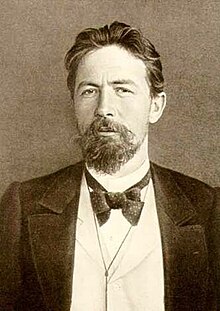एन्टोन् चेखोव

(January 29 [O.S. January 17] 1860 – July 15 [O.S. July 2] 1904) (Russian: Анто́н Па́влович Че́хов, Russian pronunciation: [ɐnˈton ˈpavləvʲɪtɕ ˈtɕɛxəf]) was a Russian short-story writer and playwright, considered to be one of the riting career produced four classics: The Seagull, Uncle Vanya, Three Sisters, and The Cherry Orchard; and his best short stories are held in high esteem by writers and critics.[१][२] Chekhov practised as a doctor throughout most of his literary career: "Medicine is my lawful wife," he once said, "and literature is my mistress."[३]
Chekhov renounced the theatre after the disastrous reception of The Seagull in 1896; but the play was revived to acclaim by Konstantin Stanislavsky's Moscow Art Theatre, which subsequently also produced Uncle Vanya and premiered Chekhov’s last two plays, Three Sisters and The Cherry Orchard. These four works present a special challenge to the acting ensemble[४] as well as to audiences, because in place of conventional action Chekhov offers a "theatre of mood" and a "submerged life in the text."[५]
Chekhov had at first written stories only for the money, but as his artistic ambition grew, he made formal innovations which have influenced the evolution of the modern short story.[६] His originality consists in an early use of the stream-of-consciousness technique, later adopted by Virginia Woolf and other modernists, combined with a disavowal of the moral finality of traditional story structure.[७] He made no apologies for the difficulties this posed to readers, insisting that the role of an artist was to ask questions, not to answer them.[८]
References[सम्पादन]
- ↑ "Greatest short story writer who ever lived." Raymond Carver (in Rosamund Bartlett’s introduction to About Love and Other Stories, XX); "Quite probably the best short-story writer ever." A Chekhov Lexicon, by William Boyd, The Guardian, 3 July 2004. Retrieved 16 February 2007.
- ↑ "Stories… which are among the supreme achievements in prose narrative." Vodka miniatures, belching and angry cats, George Steiner's review of The Undiscovered Chekhov, in The Observer, 13 May 2001. Retrieved 16 February 2007.
- ↑ Letter to Alexei Suvorin, 11 September 1888. Letters of Anton Chekhov.
- ↑ "Actors climb up Chekhov like a mountain, roped together, sharing the glory if they ever make it to the summit". Actor Ian McKellen, quoted in Miles, 9.
- ↑ "Chekhov's art demands a theatre of mood." Vsevolod Meyerhold, quoted in Allen, 13; "A richer submerged life in the text is characteristic of a more profound drama of realism, one which depends less on the externals of presentation." Styan, 84.
- ↑ "Chekhov is said to be the father of the modern short story". Malcolm, 87; "He brought something new into literature." James Joyce, in Arthur Power, Conversations with James Joyce, Usborne Publishing Ltd, 1974, ISBN 978-0-86000-006-8, 57; "Tchehov's breach with the classical tradition is the most significant event in modern literature", John Middleton Murry, in Athenaeum, 8 April 1922, cited in Bartlett's introduction to About Love, XX.
- ↑ "This use of stream-of-consciousness would, in later years, become the basis of Chekhov's innovation in stagecraft; it is also his innovation in fiction." Wood, 81; "The artist must not be the judge of his characters and of their conversations, but merely an impartial witness." Letter to Suvorin, 30 May 1888; In reply to an objection that he wrote about horse-thieves (The Horse-Stealers, retrieved 16 February 2007) without condemning them, Chekhov said readers should add for themselves the subjective elements lacking in the story. Letter to Suvorin, 1 April 1890. Letters of Anton Chekhov.
- ↑ "You are right in demanding that an artist should take an intelligent attitude to his work, but you confuse two things: solving a problem and stating a problem correctly. It is only the second that is obligatory for the artist." Letter to Suvorin, 27 October, 1888. Letters of Anton Chekhov.
| विकिमिडिया मंका य् थ्व विषय नाप स्वापु दुगु मिडिया दु: Anton Pavlovich Chekhov |
